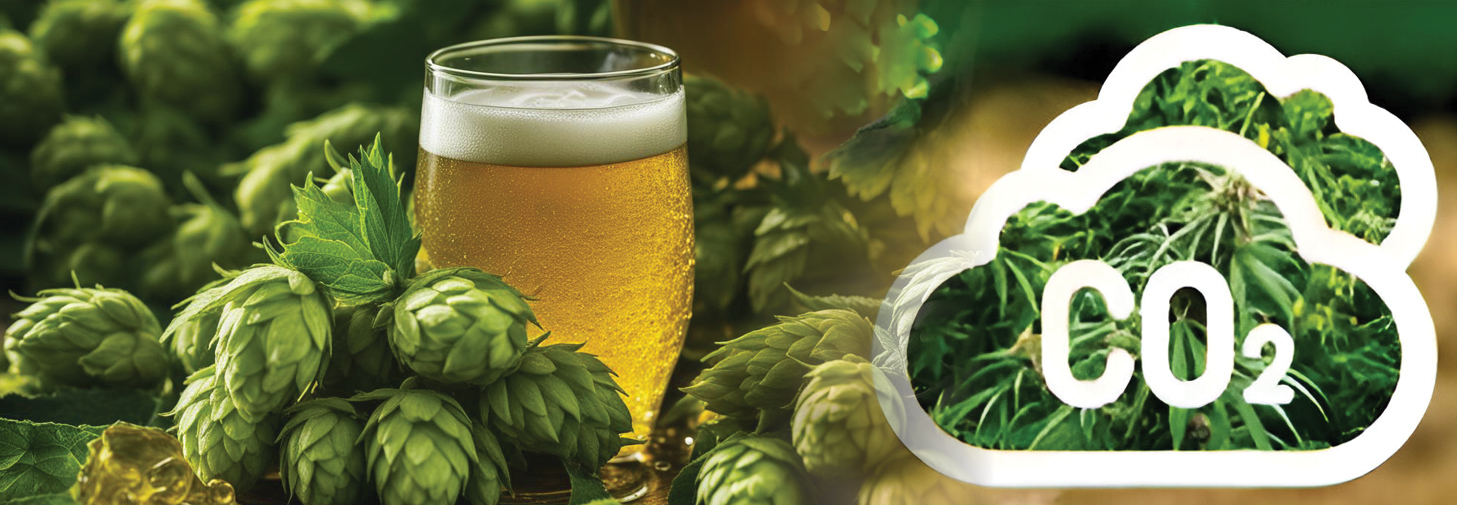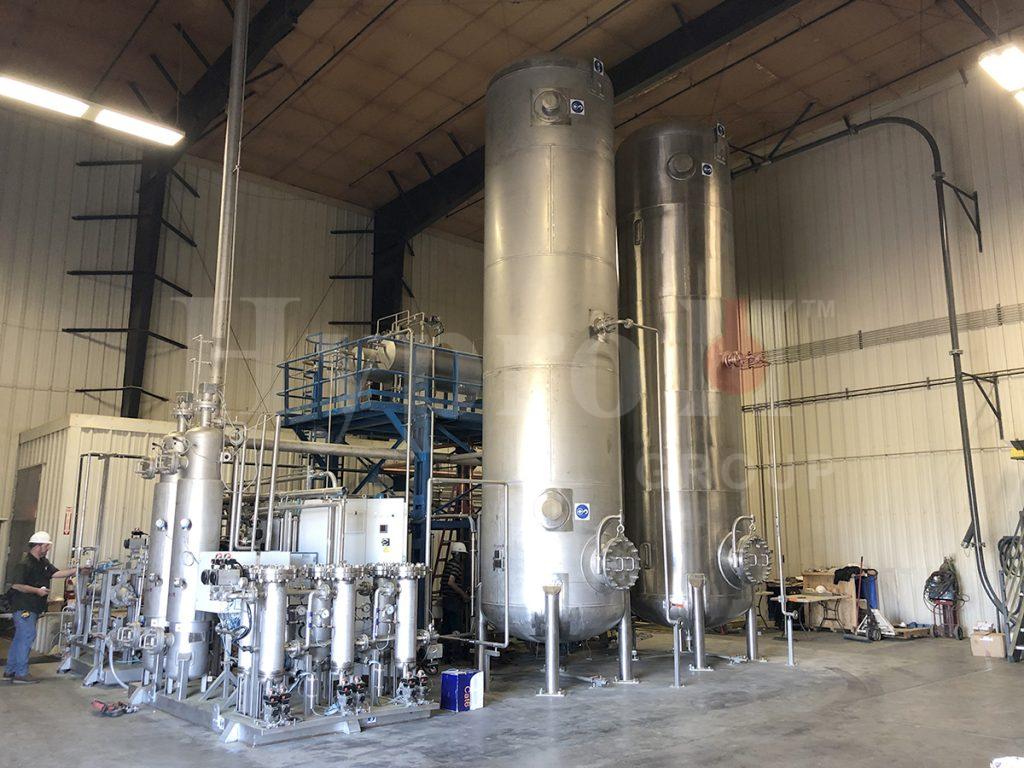#Hops #CO2 #beer #Sustainability
Key Market Trends in Hops Processing Shaping the Future of Brewing.
The hops processing industry is undergoing a transformative shift. With sustainability at the forefront, the demand for specialty hops surging, and cutting-edge technologies redefining efficiency, the future of brewing is being shaped by key industry trends. In this article, we explore how these developments are revolutionizing the harvest-to-market journey, making hops processing more sustainable, efficient, and consumer-focused.

1. The Rise of Specialty Hops: Driving Consumer Demand
As craft brewing continues to reshape beer preferences, the demand for specialty hops has surged, fostering innovation in flavors and aromas.
Brewing Innovation and Consumer Preferences
Specialty hops like Sabro (coconut-forward flavor) and Galaxy (tropical citrus notes) cater to the craft beer movement’s demand for unique, premium beer experiences. These varietals thrive in hazy IPAs, pale ales, and experimental brews, elevating flavor profiles for brewers worldwide.
Collaborative Breeding Programs
Partnerships like the Hop Breeding Company (HBC) – a collaboration between YCH and Select Botanicals – focus on developing proprietary strains such as Citra and Mosaic. These hops dominate the craft beer industry and have become symbols of innovation through controlled breeding practices.
Global Market Expansion
Countries in the Asia-Pacific region, including Japan and South Korea, are embracing craft beer culture, boosting demand for premium and specialty hops. Emerging markets are becoming growth hubs, encouraging global producers to cater to local beer styles and flavors.
2. Sustainability as the Industry’s Core Focus
The push for sustainability remains a cornerstone of hops processing, as companies adapt eco-conscious solutions to meet environmental goals and market expectations.
Global Push for Green Solutions
Organizations like Yakima Chief Hops (YCH) are embracing CO₂ recovery systems to reduce emissions, with Hypro leading the way in providing efficient, sustainable solutions. Hypro’s systems recover CO₂ with a guaranteed purity of 99.998% v/v at pressures below 260 psi. Designed for energy efficiency, these systems process nearly 40% of CO₂ without the need for compression or pumping energy. Operating at high CO₂ recovery efficiency exceeding 90 to 95% of recoverable CO₂, Hypro’s supercritical CO₂ recovery plant reduces CO₂ release to the atmosphere by 80%. By minimizing the need for new CO₂ purchases and protecting equipment, Hypro helps businesses optimize both environmental and economic performance.

YCH, through its collaboration with Hypro, has reduced its carbon footprint significantly while maintaining the high quality of its hops. This partnership highlights how integrating sustainable technologies into hops processing benefits both the environment and profitability.
Transition to Renewable Energy
The adoption of renewable energy sources, such as solar-powered kilns for hops drying, is gaining momentum. For example, hop farms in Germany are leading the way by utilizing solar technologies that reduce energy-intensive operations during post-harvest processes.
Certifications for Sustainability
Programs like the Sustainable Hop Initiative (SHI) in the Pacific Northwest promote green certifications, encouraging growers to adopt practices like:
- Organic fertilizers to reduce soil degradation
- Water-efficient irrigation systems
- Crop rotation for improved biodiversity
Brewers and consumers increasingly prioritize sustainably certified hops, driving growers and processors to achieve measurable environmental benchmarks.
3. Harvest-to-Market Technologies: Redefining Efficiency
Advanced technologies are revolutionizing post-harvest processes, ensuring hops are efficiently managed from harvest to brewery.
IoT-Enabled Monitoring Systems

Interconnected sensors powered by the Internet of Things (IoT) monitor and optimize critical parameters, including:
- Temperature and humidity during hops drying and storage
- Real-time data on storage conditions to prevent spoilageThese systems help processors maintain hop quality while reducing wastage, particularly during transportation across global markets.
Automation and Robotics
Robotic solutions are enhancing precision and efficiency in post-harvest processes:
Optical Sorting: High-resolution sensors identify defects, sort hops by quality, and ensure consistency in final products.
Automated Case Packing: Robots pack processed hops into containers, minimizing labor costs and ensuring gentle handling to preserve hop integrity.
AI and Predictive Analytics
Artificial intelligence and machine learning algorithms analyze historical & real-time data to:
- Predict optimal storage conditions for hops based on their moisture and oil content
- Forecast spoilage timelines to optimize inventory and prevent lossesThis technology improves post-harvest management, reducing uncertainties and increasing operational efficiency.
Solar-Powered Storage Solutions
Refrigeration and storage systems powered by solar energy provide sustainable alternatives to traditional high-energy processes. Hop farms can leverage site-selection software to identify optimal panel locations for maximum energy yields.
4. Digitalization in Hops Processing
The integration of digital tools is streamlining operations, offering brewers and processors access to real-time insights and enhanced control.
End-to-End Traceability
Digital traceability systems, such as blockchain platforms, allow breweries to track hops from harvest to brewing. This transparency reassures brewers and consumers of quality and sustainability while fostering trust in the supply chain.
Automation in Extraction Technologies
Supercritical CO₂ extraction, a modern technique for obtaining hop oils and resins, benefits from automation. By integrating advanced controls, processors ensure precision and consistency in capturing essential oils that define a beer’s aroma and flavor.
Data-Driven Decision-Making
Processors leverage cloud-based systems to analyze trends in hop yield, quality, and market demand. These insights enable better decision-making in procurement, logistics, and distribution.
5. Collaborative Innovations: Industry Partnerships Pave the Way
The hops processing industry thrives on collaboration, with partnerships fostering sustainable and technological advancements.
Joint Ventures for CO₂ Recovery
Collaborations between hops processors and CO₂ technology providers are playing a significant role in enhancing sustainability. While companies like YCH focus on minimizing emissions through CO₂ recycling, technology partners like Hypro provide systems specifically designed for efficient CO₂ recovery. These solutions integrate seamlessly into extraction processes, supporting breweries in achieving closed-loop, eco-friendly operations without compromising efficiency. This partnership-driven approach highlights the industry’s commitment to sustainability while addressing economic and environmental goals.
Research into Climate-Resilient Hops
Institutions like the International Hop Growers’ Convention (IHGC) are spearheading research into climate-resilient hop strains. For example, drought-resistant varieties are being developed for regions like Southern Europe, where rising temperatures pose significant challenges for hop growers.
Circular Economy Initiatives
Collaborative projects are transforming spent hops and processing by-products into value-added solutions. One standout initiative involves converting spent hops into biochar, an eco-friendly soil amendment that improves crop health while reducing waste.
6. Emerging Market Opportunities: Tapping into Global Growth
The global hops processing landscape is seeing unprecedented growth in emerging markets, presenting new opportunities for producers and processors.
Asia-Pacific’s Growing Craft Beer Market
With a rising middle class and evolving tastes, countries like China, Vietnam, and India are witnessing increased demand for craft beer. This growth fuels opportunities for hops processors to establish partnerships and infrastructure that cater to regional preferences.
Sustainability as a Market Differentiator
Environmentally conscious breweries are seeking suppliers who align with their sustainability goals. Processors adopting CO₂ recovery systems, renewable energy solutions, and waste-reduction strategies are gaining competitive advantages.
A Transformative Future for Hops Processing
The future of hops processing is rooted in sustainability, innovation, and collaboration. From specialty hops catering to evolving consumer tastes to advanced technologies optimizing harvest-to-market efficiency, the industry is undergoing a profound transformation. Companies like YCH and technology partners such as Hypro demonstrate that integrating sustainability and modern technology isn’t just a market trend—it’s a necessity for long-term success.
As global demand for high-quality hops continues to rise, embracing these market trends will ensure that processors and brewers alike are well-positioned to thrive in a dynamic, competitive landscape.
Interested in learning more about how CO₂ recovery systems and sustainable hops processing can improve your brewery’s operations? Contact us today for more information on Hypro’s solutions and how they can help you achieve your sustainability goals.
Related Posts
Beer and Wine Sustainability Showdown: Tracing the Footprint from Soil to System
Every glass begins with the earth beneath it. Beer and wine sustainability isn’t brewed or fermented—it’s grown. This piece journeys from soil to system, uncovering...
Read MoreInside the Carbon Footprint of Beer and Wine
From heat-intensive brewing cycles to the slow, electricity-driven rhythms of winemaking, each beverage carries a distinct carbon signature. This comparison reveals how fermentation behaviour, energy...
Read MoreBeer vs Wine: Packaging and Transportation Emissions
Packaging and transportation emissions increasingly determine how sustainability outcomes vary between beer and wine. This article examines where emissions truly accumulate—and why upstream and downstream...
Read More



